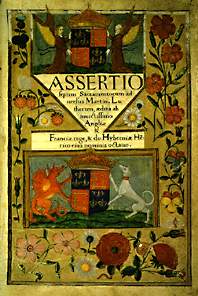Katherine Parr: Religious Writings
Chapter 3 : Developing Spiritual Interests
Henry VIII had always enjoyed theological discussion and research, even writing his own book, back in 1519 – Assertio Septem Sacrementorum Adversus Martinem Lutherum. It may be that a desire to develop an intellectual relationship with Henry and be good company was, as Katherine implied later when he complained of her trying to lecture him, her initial reason for getting involved in theological study. It is realistic to suppose that the wanted to develop a bond with him that was not primarily physical. To begin with, Henry seems to have encouraged Katherine's interest in theology - until she began to contradict him too freely.

For by delving into these areas, her own emotional response to religion had been stimulated and was leading her to embrace the more personal relationship with God espoused by the Protestants.
One of the fundamental desires of the reformers, from the early evangelicals to the radical Protestants, had been for the Word of God to be available in English, and it is apparent from all of Katherine's activities, both as writer and patron, that this was a mission dear to her heart.
In April 1544, an English translation of Bishop Fisher of Rochester's Latin " Prayers or Psalms taken out of Holy Scripture" appeared. Despite appearing anonymously, this translation is attributed to Katherine by one of her biographers, Susan James, on three grounds in particular – the similarity of some of the wording to that used in Katherine's own later work; its regular publication with works she definitely wrote; and the bills for copies of books that might be this one. Another biographer, Linda Porter, is a little more equivocal in attribution, but adduces a convincing reason for why it might have been done anonymously: Fisher had been executed by Henry VIII, causing shockwaves at home and abroad, so he was probably not a man to talk about too frequently or be seen emulating. Fisher was, of course, a martyr for the supremacy of the Catholic Church, and, if Katherine were his translator, that would tend to suggest a moderate theological position during the translation period.
From, perhaps, a personal translation, Katherine went on to be the moving spirit behind the publication of the English translation of Erasmus' "Paraphrases upon the New Testament". The editor was Nicholas Udall – famous alike for his scholarship and his brutal sexual abuse of his pupils at Eton College. (Ed. Nothing ever changes!) The translators were various – Katherine may have worked on the St Matthew personally, but her main contribution was in persuading well-known Latinists to take a share, including her step-daughter, the Lady Mary. The book went through numerous editions in the sixteenth century, from its initial publication in January 1548.




